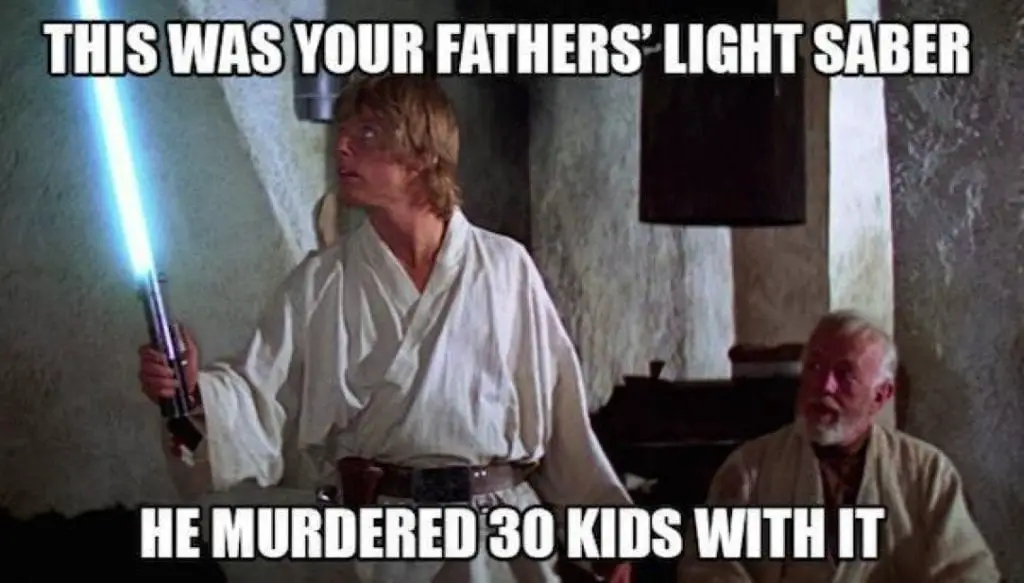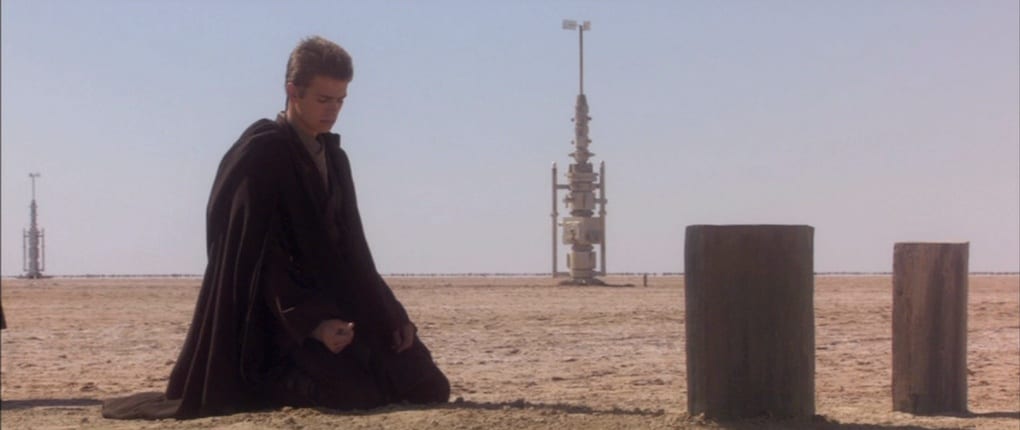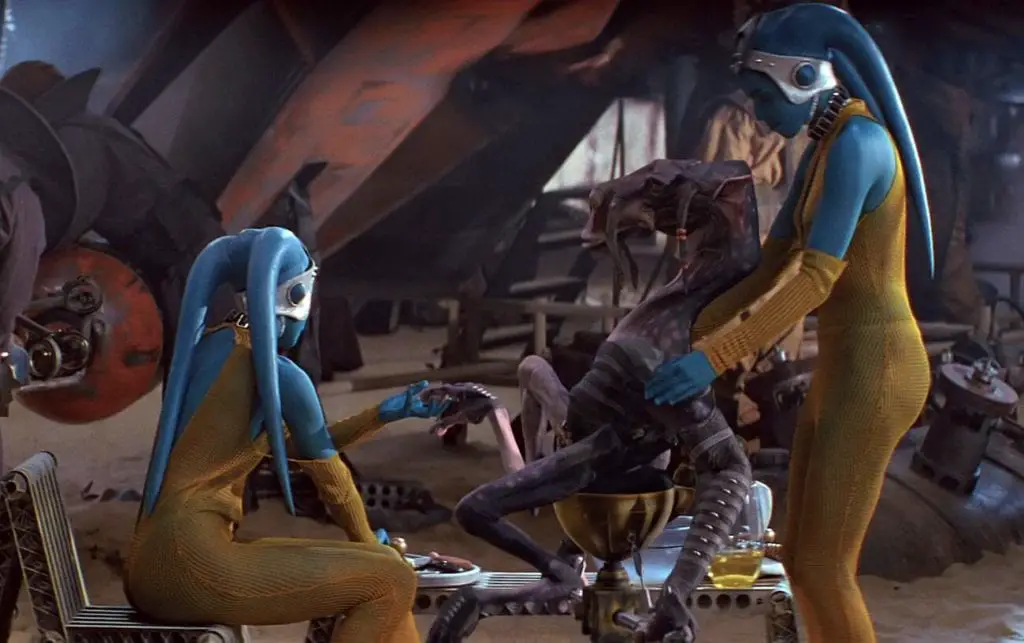We sometimes talk of expectations as if it was something bad, something to be ashamed of. This is, of course, totally wrong. If a person decides to consume a certain piece of media, this person does it because they expect something of it. Even if all they expect is to relax and spend several hours mindlessly staring at the screen or turning pages, that’s still an expectation. It becomes trickier with Star Wars, as expectations of this franchise are fed by literal decades of the fandom’s existence.
Here, people seem to be taught to expect certain things, certain plot points and moral messages. The Universe itself teaches them. If something went a certain way in three movies, a dozen comics and a dozen books, then, naturally… or not?
Is it natural at all that everything goes according to our expectations? And is a negative response from an audience okay when it doesn’t? I’d say, it depends. What were the expectations? What expectations were not fulfilled? Why weren’t they?
Sometimes it turns out that creators had a very good reason for subverting expectations. One that doesn’t oblige you to agree with them, but does oblige you to understand their point. But sometimes it turns out, however valid the reason, the outcome was still…not brilliant, let’s say.
New Movies in Star Wars: Expectations (and Novelty)
Now we have not one, but two examples of audience/creator conflict in Star Wars. The first happened when the prequel trilogy (PT) hit the screens, the second is now with the sequel trilogy. Both situations have the same core issue: are the creators obligated to give us what we expect or are they allowed to bring something new into an old franchise?

Now, I’m not usually the kind of person who quotes the Bible, but nothing explains the situations better than this quote:
No one pours new wine into old wineskins. Otherwise, the new wine will burst the skins; the wine will run out and the wineskins will be ruined.
If you want to give the audience something new: do it. Don’t mix the new with old and pretend that it was always this way. Yes, this was my main problem with the PT and Episode VII. I’m of the opinion that one should either rely fully on nostalgia, or create powerful change to your universe, not both at once.
What Were The Expectations?
With such a popular franchise, and with the Expanded Universe (EU) to feed the people’s interest, there were certain expectations when the PT hit the screen. And not general “we want to know more about this universe”, but rather very specific expectations. I will focus on the PT here on out; while Episode VII falls into many of the same pitfalls, it came on screens mostly in a blank state. People who wanted a new Star Wars movie wanted just that: a very vague thing that would “feel like Star Wars” for them. Others didn’t want there to be any new Star Wars movies at all. The prequels had the other situation.
They hit the screen back when people knew what they wanted from the films. They had a certain ideas about the plot; it had to revolve around a conflict between an individual and The System, with the individual being on the winning side. Audiences also had a certain aesthetic in mind, namely, a used future one. Last but not least, they wanted to know how Jedi Anakin became Darth Vader and who the heck was Luke’s (and Leia’s) mother. Generally, the idea was that the new movie should be something familiar, but not entirely.
What The PT Did Right
You’d probably be surprised, but a lot of things. And some of the things the prequels did right earned them a lot of hate, which is sad. Like, they did it right with regards to the expected “Individual vs System” conflict. Instead of a happily ended external conflict, the PT presented an internal conflict that ended in utter devastation. While it was not what audience expected, it was a really good thing to do.

Or, for example, they did it right when they made Anakin a very emotional, passionate, and often unbalanced young man instead of whatever cool warrior guy everyone imagined looking at Darth Vader. Because Vader’s supposed cool-ness, really his lack of any emotion, was not anything good and existed to show how far he had fallen from being a real human being. (Remind me to come back at some point to Vader vs. Anakin and toxic masculinity as a source of that controversy.)
The Jedi changing from mythical knights in shining armor to a flawed religious institution was another one of the moments done…mostly, right. (More on it later on.)
What I’m trying to say is that subverting and even going against expectations can be a great thing to do. It may be even necessary for the next installment to be wider and deeper than the previous, to be anything even a touch bigger than being just a prequel/sequel. And for all their many faults, the only real strength of the PT lies exactly in those areas where it went against expectations. However, not every new thing was good. There are many ways to do it wrong.
Going Half-way Only
There are different kinds of new themes and motifs. They can naturally grow off the old ones, like a flower grows from a seed. They can be completely new, but still connected to the old ones. And then, they can be a “what was that and why is it here?” kind of new.
I have nothing against a good political drama, mind you. But the problem is, Star Wars was not quite a good place for it. The political ideas in the PT were simplified right from the beginning, and the political parties as arbitrary as its physics. There was no reason for a political drama to become a part of this universe, much less a foundation of the whole trilogy.
Also, if you wish to bring in an entirely new theme, good for you, do it. But make it not feel alien and intrusive. When you want your audience to dive into politics, you better explain the rules to them and make those rules familiar, or at least understandable. Yes, that would require rebuilding the universe so that those rules would make sense, but you are going for something new, aren’t you?
The combination of a completely new theme (political drama) and lack of any specifics—neither side states what they want or what their ideas are, they just exist and one is here for the evhuls—made it for exceptionally unbearable. It’s not that we suddenly have to think about a new trade law, it’s that we never know why it was important at all.
More On This With Worse Problems
The PT moved into the political, into the personal, into very much a different realm than the original trilogy (OT) reigned in. But they couldn’t entirely disconnect from the previous installments; so what did they choose as their core, as a sign “this is the Star Wars you are looking for”? Well, quite a lot.

The OT had many good parts, some neutral, and many not so good. The good parts of the OT—the themes of hope, freedom, fighting for a good cause, and the importance of positive attachments—were somehow left behind in the PT. Maybe because the prequels went for a downer ending. The neutral and not so good parts, though…
One can argue, of course, that the Chosen One idea, the idea of Born Special, is the core of Star Wars saga. But if you don’t take the PT into account, it would be much less obvious. The OT certainly used this trope, but only as a prop for the main idea, which was that love trumps hate and family trumps disconnection. Luke’s parentage was especially important for those themes, not for his Chosen One narrative. Re-making Born Special into the one and only reason for Luke to become a hero arguably ruined the thematic core of the originals.
As far as the not so good parts go, the PT became even worse. Episode VI presented a colorful (metaphorically) display of alien stereotypes and gratuitous objectified females. For some reasons, this was the legacy the PT were chosen to bear. Not the legacy of brave (if very background) aliens of the Rebellion and the EU idea of them being (at least in name only) diverse and having their own interests. No surprise this choice lead to controversies about racism in Star Wars.
But Was That New Really New?
Many people argue that at least the political part was a mirror of then modern, American life. Well, I am not American, so I saw something very different. Now, if someone sees their current situation in a media, ones who don’t are not here to argue that’s an incorrect reading. It’s their own response based on their experiences.
But it’s hard not to notice that the whole political plot had significant echoes with older political situations. Mainly, the press response to Watergate, which was a major event for American political history but hardly relevant for early 2000s. It uses the same analogies (Caesar, Hitler) and just like (most of) the press, the PT has little understanding of either. Which, I can assure you, leads to unintentional facepalms when those parallels are explicitly drawn.
Not that it was “timeless”, either. If you want timeless, watch Wag the Dog. The story of a vaguely evil guy using a vague war to pave himself a way to suddenly just declare himself emperor of a new system of government is too vague and too convoluted to be timeless.
Combine that with ideas ripped straight out of the 1950s (like female politicians having to stay unmarried and unmarred by any suspicion of having a personal life), Ben Hur-like larger than life characters (who suddenly fall into quite good psychological etudes, further confusing the viewer), and dialogue written to remind viewers of old cowboy movies and Westerns…
…it was NOT modern. Not in any way.
That’s Why I Prefer Episode VIII
The PT tried to introduce radically new themes, but didn’t bother to create any environment for them. Instead they played on the same old, vague rules that the OT operated under. They catered to people’s nostalgia, but did so while choosing not the best parts of the previously existing universe. While modern in appearance, they were outdated in the delivery of many themes, in acting, and in writing.
This created confusion; it felt like a mess and like an unfulfilled promise simultaneously. That’s why I consider it a bad example of unfulfilled expectations.
The Last Jedi may be hated for being too new and for not delivering what the audience expected, but it knows how to do it. The new it presents naturally grows out the old; if a universe built on tropes exists, a deconstruction must occur at some point. And it better be an organic part of the universe, not an outside parody. This allows the universe to grow beyond those tropes, to morph into something completely different, yet still remain the same at the core.
Because the true core of the universe, if this fictional universe is of any worth, is never tropey. It has to be true. Episode VIII knows this, and it delves deep, shedding one trope after another, until it finally arrives to the core—the core of Luke’s character, the core of the whole franchise—and shows it to us in all its brilliant glory.
It also knows that to be new, you have to be modern. That’s why it eschews the traditional white/male/young hero triad in favor of its older, non-white, and female heroes.
But to be new, you also have to be timeless. And that’s why its message is not only relevant to the current political situation, but to any one, in past, present, or future. When any people resist fascism by any other name, The Last Jedi will be there.

